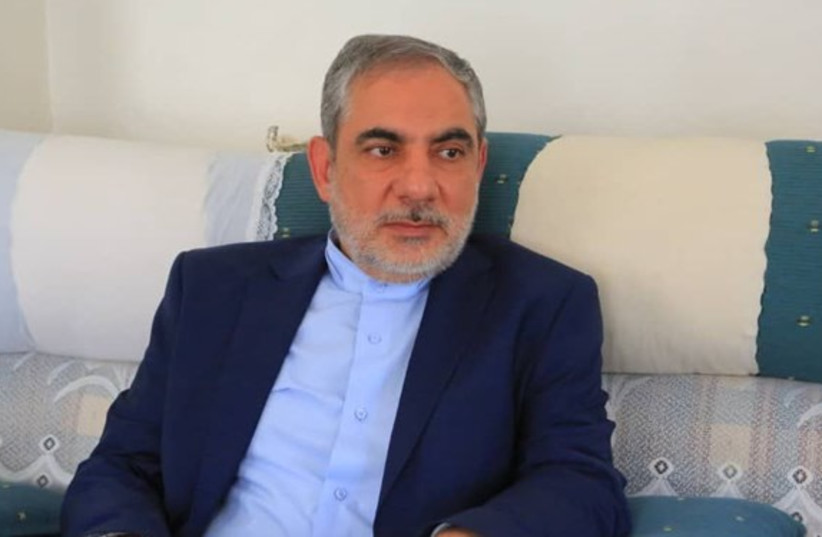Iran announced on December 21 that Hasan Irlu, its ambassador to the Houthi rebels in Yemen, had died at age 63, apparently after contracting corona. Who was Irlu – and why did Iran’s announcement of his death conflate him with the elusive Iranian terrorist commander Abdulreza Shahlai?
Suspicions about the Iranian envoy’s identity were aroused when Iran’s official news agency, IRNA, and Iranian Foreign Ministry spokesman Saeed Khatibzadeh first announced Ambassador Irlu’s death, saying he “was also known as General Shahlai” – but later removed the reference to Shahlai from its website.
“He was one of the commanders of the resistance and his pivotal role alongside martyr Qasem Soleimani in forcing the US out of Iraq [under then-president Barack Obama] as well as in the expulsion of Mujahedin-e-Khalq (MEK) from Iraq are among his unforgettable feats,” IRNA wrote in its obituary, referring to Irlu as “a martyr” and “a chemical warfare veteran” of the Iran-Iraq War.
Shahlai, on the other hand, is an Iranian military officer who holds the rank of brigadier general and serves as commander of the Yemen division of the Quds Force of the Islamic Revolutionary Guard Corps (IRGC). He is an enigmatic figure whose picture has never been published in the Iranian media.
In 2019, US Special Representative on Iran Brian Hook announced that the State Department was offering $15 million for information about Shahlai, who is classified by the US as a terrorist for funding terror groups and masterminding attacks on American troops in Iraq.

“Given Shahlai’s track record of terrorism and destabilization in Iraq, we remain gravely concerned by his presence in Yemen and potential role in providing advanced weaponry of the kind that we have interdicted to the Houthis,” Hook said at the time.
He noted that Iran’s involvement in Yemen – including its provision of sophisticated weapons and missile parts – had wreaked havoc in the region.
The US holds Shahlai responsible for a string of attacks against coalition troops in Iraq, including a sophisticated assault in Karbala on January 20, 2007, that killed five soldiers. Other alleged attacks led by Shalai include a failed assassination attempt on the former Saudi ambassador in Washington, Adel al-Jubeir, at a restaurant in Georgetown in 2011.
Shahlai served as a deputy to arch-terrorist Qasem Soleimani, who was assassinated in a targeted US drone strike on January 3, 2020, in Baghdad on the orders of then-president Donald Trump. News agencies reported that Shahlai had also been a target of the attack. The US drone strike in Sana’a, where Shahlai was based, failed to kill him but did result in the death of IRGC member Mohammad Mirza.
Shahlai has been involved in different arenas of terror out of Iran, mainly in the Middle East and Europe, but he has agents in North America too. US intelligence services believe that Shahlai is extremely active and always moving to different areas – from Yemen and Iraq to Kurdistan, Syria, Lebanon, Djibouti and elsewhere – organizing military operations for the Quds Force. He supports the Hashd al-Shaabi militia in Iraq, Hezbollah in Lebanon, and other groups fighting US troops.
But back to Irlu, who died in a hospital just a week after he had been flown to Iran from Yemen for treatment. Iran’s Foreign Ministry spokesman blamed “delayed cooperation from certain countries” in flying Irlu to Iran. He was apparently pointing a finger at Saudi Arabia, which only after mediation by Iraq and Oman agreed to help Irlu’s transfer to Yemen aboard an Iraqi plane.
A US official declared after Irlu’s death that the $15 million reward for Shahlai “still stands,” meaning that Irlu was not Shahlai. The State Department later clarified that the two individuals were indeed two different people. Therefore, according to Washington, the top Iranian terrorist is still alive and kicking.
A Saudi-led coalition intervened militarily in Yemen in 2015 against the Iran-aligned Houthis after they ousted the internationally recognized government from Sanaa, the capital. The coalition has imposed a sea and air blockade since 2016 on areas the Houthis control, including flights from Sanaa International Airport. Saudi Arabia and Iran recently launched direct talks over Yemen, as global powers seek to salvage the 2015 Iran nuclear pact and after UN-led efforts to end the Yemen war bore no fruit.
On December 8, 2020, following his appointment by Tehran, Irlu was blacklisted by the US Treasury, and had imposed sanctions on him. In its statement explaining the designation, it referred to Irlu as an official in Iran’s Islamic Revolutionary Guard Corps-Quds Force, and the Iranian regime’s envoy to the Houthi rebels in Yemen, noting that “Iranian support to the Houthis, spearheaded by the IRGC-QF, continues to foment instability in Yemen, the world’s worst humanitarian crisis.”
Then-Treasury secretary Steve Mnuchin added, “The appointment of an IRGC-QF official as an envoy to the Houthi rebels in Yemen demonstrates the Iranian regime’s indifference to resolving the conflict, which has led to the widespread suffering of millions of Yemenis.” ■
Dr. Daniel Dana is an Iranian-Israeli expert and advocate.
